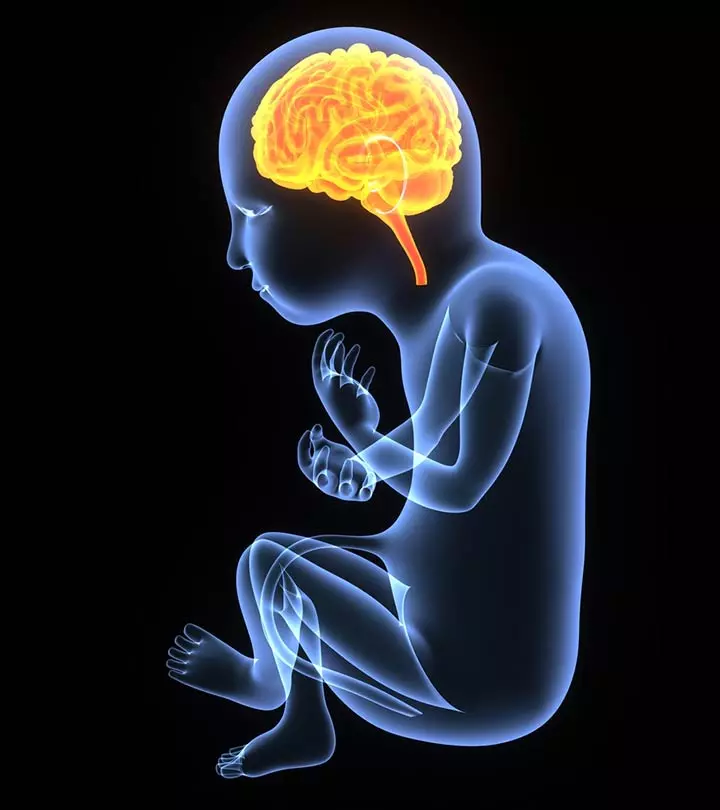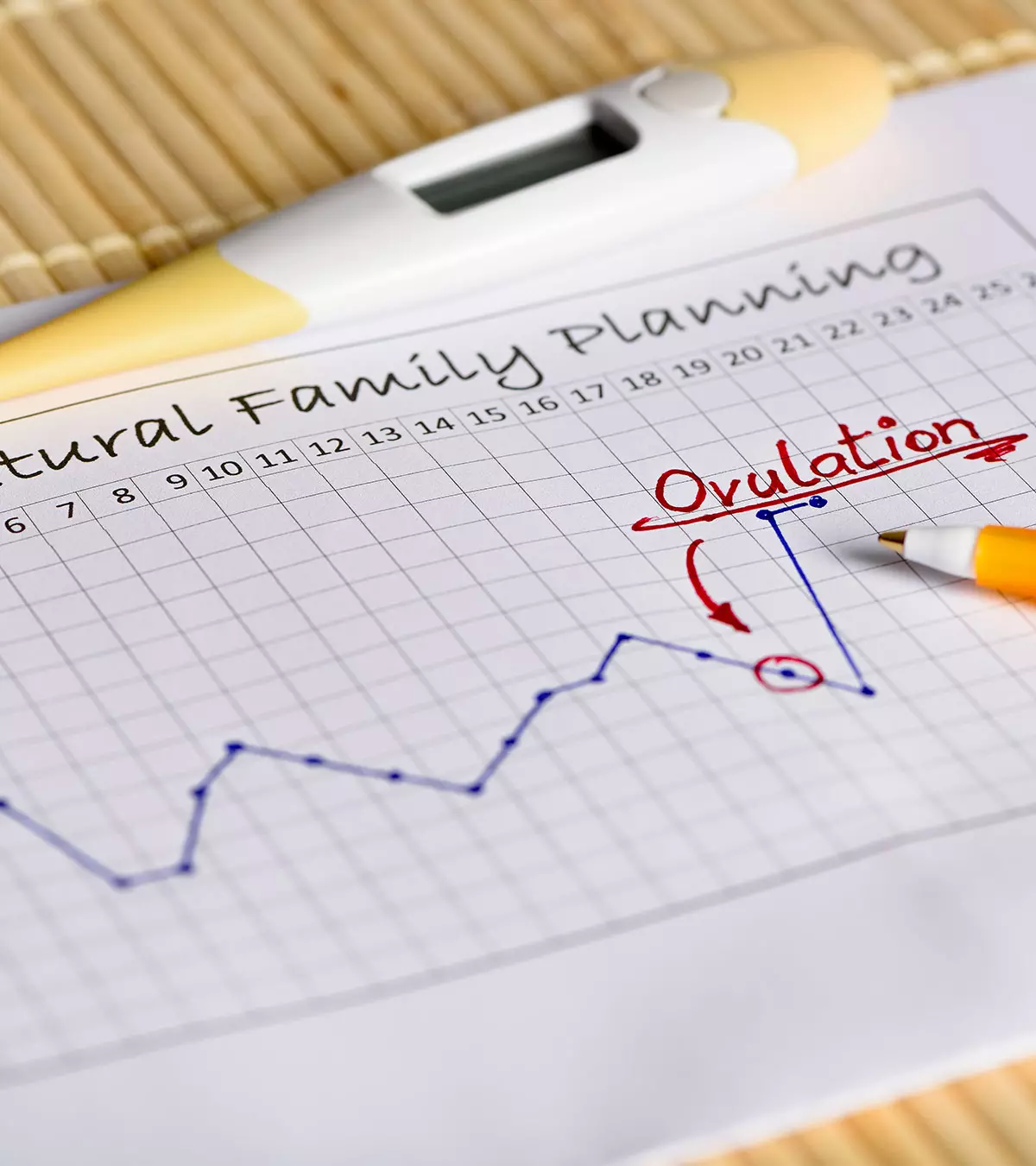

Image: Shutterstock

Fetal brain development is a gradual process that begins almost immediately after conception and continues till birth. Most often, the baby’s brain development begins before the woman is aware of her pregnancy (1). It usually commences between the 17th and 30th day after conception or four to six weeks after the first day of the last menstrual cycle. The brain continues to grow during infancy, and the entire development process is completed by early adulthood.
Read this post to learn about the nutritional factors that may affect fetal brain development and the different stages of fetal brain development.
Fetal Brain Development Timeline
The central nervous system (CNS) comprises the brain and spinal cord, covered by membranes called meninges. The brain consists of the cerebrum, cerebellum, brain stem, and deeper structures, including the hippocampus, amygdala, hypothalamus, and pituitary gland, which develop in different stages of intrauterine life. They interpret and process the information received from the body and send signals to control all bodily functions.
The timeline of prenatal brain development is as follows (2):
The first trimester
- The brain development in the embryo (developing baby) begins with forming a neural plate (a layer of tissue with special cells) at around two weeks after conception.
- The neural plate gradually folds into a tube-shaped structure called a neural tube.
- The neural tube closes its edges and forms the brain, skull, spine, and spinal cord (1).
- The first neurons and synapses are formed in the spinal cord seven weeks after conception.
This early spinal–neural connection allows the fetus to move, often seen in prenatal ultrasounds. These fetal movements provide sensory input for the brain to spur its development. More coordinated movements develop in the last weeks of the first trimester.
The second trimester
- Gyri and sulci—the folds that give the brain its wrinkled appearance—begin to be visible in the early weeks of the second trimester and are almost completely formed by the end of it.
- The cerebral cortex’s thickness and complexity increases, forming synapses in this stage.
- The axons of some nerve cells (neurons) begin to be covered with myelin in a process called myelination, allowing faster transfer of information through the neurons. This process continues through adolescence.
The third trimester
- The cerebral cortex becomes more functional this trimester and takes over many duties carried out by the primitive brain stem.
- Responses to external stimuli, fetal breathing, and various other reflexes are regularized.
- Early learning and rapid brain growth occur at this time.
The brain continues to mature after birth, which explains why many primitive reflexes in newborns gradually disappear during infancy. Preemies, especially those born too early, may have problems later due to interrupted brain development that lacks several brain growth spurts of the last trimester of pregnancy (3).
Nutritional Factors Impacting Fetal Brain Development
Prenatal vitamins and nutrients are important for the development of the fetus. Therefore, obstetricians and gynecologists may prescribe supplements since food alone may not satisfy the daily nutrition requirements.
Roland Kupka, Regional Nutrition Adviser, UNICEF East Asia & Pacific Regional Office, says, “The nutrients a child receives in the earliest years of life influence their brain development for life and can make or break their chance of a prosperous future. By protecting and supporting children’s development in early life, we are able to achieve immense results for children throughout their lifespan (4).”
The American College of Obstetricians and Gynecologists (ACOG) recommends the following vitamins and minerals during pregnancy for a baby’s brain development (5):
1. Folic acid
Folic acid or vitamin B9 helps prevent neural tube defects (NTDs), which are birth defects of the brain and spinal cord, such as anencephaly and spina bifida.
According to ACOG, pregnant women need 600mcg of folic acid each day. Begin taking folic acid supplements at least a month before and during the first trimester of pregnancy to prevent brain defects.
Mothers who have had a child with an NTD are prescribed 4mg (4000mcg) folate daily at least three months before conception and during the first trimester.
The US Centers for Disease Control and Prevention (CDC) recommends the consumption of a 400mcg folic acid supplement daily in addition to a folate-rich diet for all women of reproductive age (6).
2. Omega-3 fatty acids
Omega-3 fatty acids are building blocks of the fetal brain and retina. Docosahexaenoic acid (DHA) and eicosapentaenoic acid are the most biologically active forms of omega-3 fatty acids.
You can get the daily requirement of omega-3 fatty acids from the following sources (7):
- Marine sources, such as seafood and algae (most abundant source of omega-3)
- Vegetarian sources, such as nuts and seeds, including chia seeds, walnuts, and flaxseeds, and plant oils such as soybean oil, canola oil, and flaxseed oil
- Dietary supplements, such as fish oil, cod liver oil, krill oil, and algal oil (vegetarian source)
- DHA-enriched eggs, milk, and yogurt or other omega-3 fortified foods
Due to the adverse effects of mercury and other contaminants in seafood, the US Food and Drug Administration (FDA) recommends limiting fish intake to two servings per week. However, most pregnant women consume little or no fish (8). If so, alternate sources of DHA, such as fish oil capsules or fortified foods, are recommended.
The fish oil capsules available in the market contain 150 to 1200mg/d of DHA, while prenatal supplements usually contain 200 to 300mg (8). Ask your healthcare provider about the best supplements available in your area.
3. Iodine
A daily requirement of 220mg of iodine is essential during pregnancy for healthy fetal brain development. It can be obtained through a diet rich in seafood, meat, fortified bread, eggs, dairy products, and iodized table salt (5).
According to UNICEF, iodine deficiency is a leading cause of preventable brain damage globally. Insufficient iodine intake during pregnancy and infancy can cause neurological and psychiatric problems and reduce eight to nine points from a child’s intelligence quotient (IQ) (4).
4. Choline
Choline plays a key role in fetal spinal cord and brain development, and a daily intake of 450mg is required during pregnancy (5).
Choline-derived phospholipids help in rapid cell growth, cell division, and myelination. The neurotransmitter acetylcholine, also choline derived, influences neurogenesis and other processes in the developing brain. Choline also plays a role in developing the hippocampus (9).
In 2017, the American Medical Association (AMA) stated that prenatal supplements should contain evidence-based amounts of choline. Likewise, in 2018, the American Academy of Pediatrics acknowledged choline as a brain-building nutrient and recommended adequate intake for pregnant women and young children (9).
Although many dietary sources, such as milk, soy products, beef liver, eggs, and peanuts, are rich in choline, they may not meet the requirement. Since choline is absent in most prenatal supplements in the market, specifically look for choline in supplements.
5. Cobalamin
Cobalamin is a B complex vitamin, also known as vitamin B12. It helps in fetal nervous system development and red blood cell formation in pregnancy and is also involved in fetal cell division, cell growth, and brain growth.
The daily requirement of vitamin B12 during pregnancy is 2.6mg, obtained from multivitamin or B vitamin supplements and food sources, such as milk, poultry, fish, meat, and peanuts.
Vitamin B12 deficiency has been associated with neurodevelopmental disorders, psychiatric disorders, and poor cognitive outcomes (10).
Ways To Nurture Fetal Brain Development
In addition to dietary supplements, the following factors may also impact fetal brain development:
1. Maintain a healthy diet
Available evidence suggests that maternal nutrition in fetal life and a child’s neonatal nutrition have a life-long impact on their neurodevelopment. As discussed, certain nutrients affect brain development more significantly, and their deficiency can cause long-term issues. However, all nutrients are important for the brain’s functional and structural development, particularly carbohydrates and proteins (11).
2. Practice prenatal exercises
Physical activities during pregnancy improve the cognitive function of the baby. For example, evidence suggests that maternal exercise can improve the infant’s memory and learning and reduce anxiety-like behaviors, possibly due to increased neurogenesis or neuronal activity in the growing brain. However, the exact mechanisms through which maternal exercise influences fetal brain development are yet to be investigated (12).
3. Manage stress
Maternal stress, anxiety, depression, exposure to natural disasters, and other stressful events during pregnancy can increase the infant’s risk for developing cognitive, behavioral, and emotional problems, such as Attention Deficit Hyperactivity Disorder (ADHD), depression, conduct disorders, and anxiety disorders, later in life (13).
Ask your gynecologist about physical activities and mindful relaxation techniques that can reduce prenatal stress.
4. Quit alcohol, drugs, and smoking
ACOG recommends abstaining from alcohol, tobacco, marijuana, recreational or illegal drugs, and prescription medication for non-medical reasons during pregnancy (14).
The effects of these substances on fetal brain development may include
- Nicotine exposure even through secondhand smoke can also cause permanent damage to the fetal brain and lungs and reduce blood supply to the brain and other parts. Using e-cigarettes and smokeless tobacco products (containing nicotine) can result in learning disabilities and cerebral palsy in babies.
- Alcohol can cause brain damage, birth defects, and fetal alcohol syndrome (FAD)—a disorder causing mental disability, behavioral issues, and other anomalies in babies. These effects of alcohol are commonly seen in binge drinkers but can also affect expectant mothers who consume lesser amounts of alcohol.
- Marijuana use during pregnancy is linked to behavioral and attention problems in children.
- Illegal drug use, including cocaine, heroin, methamphetamines (meth), and the misuse of prescription medication can also cause brain damage and birth defects.
Talk to your healthcare provider about substance use and seek de-addiction therapies before planning pregnancy. However, it is not too late to seek help during pregnancy.
5. Avoid getting prenatal infections
Maternal infections during pregnancy can increase the risk for CNS disorders, such as cerebral palsy, autism, and schizophrenia, in babies (15). Getting vaccinated for preventable infections, maintaining hand hygiene, and avoiding other risk factors may help avoid infections during pregnancy.
6. Reduce exposure to environmental toxins
The fetal brain is more vulnerable to various environmental toxins since the underdeveloped blood–brain barrier does not effectively prevent toxins from entering the brain (16).
The following toxins are known to cause brain defects in fetuses:
- Lead poisoning may cause paralysis of the legs, blindness, and cerebral palsy in babies (17).
- Motor dysfunction and mental retardation may affect babies born to mothers who consume mercury (through contaminated fish) during pregnancy.
- Mental retardation may occur in babies who consume arsenic (such as through contaminated milk).
- Trichloroethane (DDT), PCBs, bisphenol A, phthalates, polybrominated diphenyl ethers (PBDEs), etc., can cause brain development issues by altering the epigenome.
Understanding the risk of toxin contamination in your environment and food and avoiding exposure during and before pregnancy can prevent these problems.
7. Listen to music
Listening to music during pregnancy can calm the mother and enhance the baby’s brain development, helping them develop language and reading skills.
Babies begin to hear at 16–18 weeks, and at around 24 weeks of gestation, they may turn their heads in response to their mother’s voice, native language, rhymes, etc. Classical music, gentle lullabies, and melodies can soothe and evoke happiness in unborn babies (18)
The End Of Brain Development
The development and maturation of the prefrontal cortex, the part of the brain located in the frontal lobe, primarily happens in adolescence and is completed by the age of 25. This part of the brain plays a key role in behavioral performance and helps accomplish executive brain functions (19).
A baby’s brain is about a quarter the size of the average adult brain at birth, and it doubles in the first year. Further, it grows to 80% by age three and 90% by age five. Thus, major brain development occurs in the first five years after birth. Positive or negative experiences that occur in the first few years of life shape brain development, impacting a child’s ability to learn and succeed in life (20).
Interestingly, a newborn baby has all the brain cells (neurons) they will need for the rest of their life, but the connections between these neurons are developed after birth through everyday experiences. Thus, quality care, positive interactions, and stimulation are important during the early years and may result in better brain development than those facing stress and negative experiences.
Nutrients Good For Your Baby’s Brain
The nutrition received during the “first 1000 days,” from conception till two years of age, influences brain development. While all nutrients are important for optimal growth and brain functioning, the following are identified to be significantly influential for babies and children (21):
- Proteins
- Carbohydrates
- Iron
- Zinc
- Iodine
- Copper
- LC-PUFA (long-chain polyunsaturated fatty acids such as DHA and arachidonic acid)
- Vitamin A
- Vitamin B6
- Vitamin C
- Vitamin D
- Selenium
- Choline
Exclusive breastfeeding can provide all the nutrition needed for brain development until six months of age. If breast milk is not available, medically approved infant formulas can provide adequate nutrients.
Frequently Asked Questions
1. What has the most influence on brain development?
Consuming a balanced diet and maintaining a healthy lifestyle during pregnancy are essential factors for fetal brain development. After birth, children learn many skills from their parents and guardians. Hence, raising the child in a caring and nurturing environment will also influence their brain development (21).
2. What prevents a fetus’s brain from developing?
A person’s earliest experiences can greatly influence their life since a major part of brain development occurs in early life. Nutritional deficiencies in pregnancy and the early years of life can affect the normal development of the brain and nervous system. Consult your gynecologist about any prenatal vitamins, maternal exercises, and diets you can follow to impact the baby’s brain development positively.
Key Pointers
- Brain development begins within the 17th to 30th day of conception and continues for 25 years.
- The three trimesters witness development of different parts of the fetus’s brain, starting with the development of the neural plate to the cerebral cortex.
- Nutrients such as folic acid, omega 3, and iodine help the fetal brain’s developmental process.
- Following the tips for a healthy pregnancy lifestyle and a calm mind can help in the process.
References
- Folic Acid.
https://www.cdc.gov/Images_-_Video_and_Audio/Images/Folic_Acid/QandAfactfolic.pdf - Baby’s Brain Begins Now: Conception to Age 3.
https://www.urbanchildinstitute.org/why-0-3/baby-and-brain - Babies Born Early Can Have Brain Injury.
https://kids.frontiersin.org/articles/10.3389/frym.2018.00020 - Nearly 19 million newborns at risk of brain damage every year due to iodine deficiency.
https://www.unicef.org/rosa/press-releases/nearly-19-million-newborns-risk-brain-damage-every-year-due-iodine-deficiency - Nutrition During Pregnancy.
https://www.acog.org/womens-health/faqs/nutrition-during-pregnancy - Folic Acid Helps Prevent Serious Birth Defects of the Brain and Spine.
https://www.cdc.gov/ncbddd/folicacid/features/folic-acid-helps-prevent-some-birth-defects.html - Omega-3 fatty acids.
https://ods.od.nih.gov/factsheets/Omega3FattyAcids-Consumer/ - Omega-3 Fatty Acids and Pregnancy.
https://www.ncbi.nlm.nih.gov/pmc/articles/PMC3046737/ - Hunter W. Korsmo et al. (2019) Choline: Exploring the Growing Science on Its Benefits for Moms and Babies.
https://www.ncbi.nlm.nih.gov/pmc/articles/PMC6722688/ - Sudha Venkataraman et al. (2016) Vitamin B12 and Cognition in Children.
https://www.ncbi.nlm.nih.gov/pmc/articles/PMC5015033/ - Michael K. Georgieff et al. (2018) Nutritional Influences on Brain Development.
https://www.ncbi.nlm.nih.gov/pmc/articles/PMC6045434/ - Andrea M. Robinson and David J. Bucci (2012) Maternal Exercise and Cognitive Functions of the Offspring.
https://www.ncbi.nlm.nih.gov/pmc/articles/PMC4671504/ - Alexandra Lautarescu et al. (2025) Prenatal stress: Effects on fetal and child brain development.
https://pubmed.ncbi.nlm.nih.gov/32204831/ - Tobacco Alcohol Drugs and Pregnancy.
https://www.acog.org/womens-health/faqs/tobacco-alcohol-drugs-and-pregnancy - Patricia Boksa (2010) Effects of prenatal infection on brain development and behavior: a review of findings from animal models.
https://pubmed.ncbi.nlm.nih.gov/20230889/ - Bruce P. Lanphear (2015) The Impact of Toxins on the Developing Brain.
https://www.annualreviews.org/doi/pdf/10.1146/annurev-publhealth-031912-114413#:~:text=During%20fetal%20development%2C%20the%20brain - Neha Bansal et al. (2017) Association of Lead Levels and Cerebral Palsy.
https://www.ncbi.nlm.nih.gov/pmc/articles/PMC5406142/ - How music affects your baby’s brain: Mini Parenting Master Class.
https://www.unicef.org/parenting/child-development/how-music-affects-your-babys-brain-class - Mariam Arain et al. (2013) Maturation of the adolescent brain.
https://www.ncbi.nlm.nih.gov/pmc/articles/PMC3621648/ - Brain Development.
https://www.firstthingsfirst.org/early-childhood-matters/brain-development/ - Early Brain Development and Health.
https://www.cdc.gov/ncbddd/childdevelopment/early-brain-development.html - Brain Malformations.
https://medlineplus.gov/brainmalformations.html - Birth Defects.
https://medlineplus.gov/birthdefects.html
Community Experiences
Join the conversation and become a part of our nurturing community! Share your stories, experiences, and insights to connect with fellow parents.
Read full bio of Dr Esha Chainani
Read full bio of Dr Bisny T. Joseph















